MIT SCHOOL OF HUMANITIES, ARTS, AND SOCIAL SCIENCES
Media + Awards Digest | November 2020
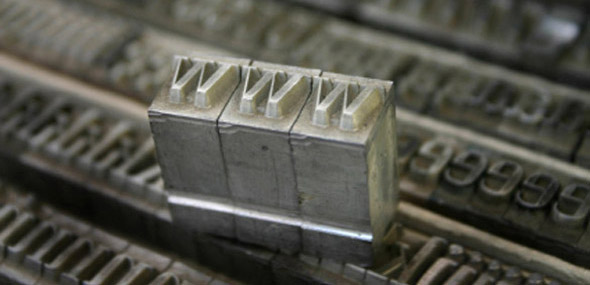
The Media + Awards Digest is a section of the Said and Done newsletter. Subscribe
Office of the Dean | 19 November 2020
Dear Friends,
As I write this, the states are in process certifying the results of the November 3 election, Joe Biden is President-elect, and all of us, whatever our political views, can be reassured that the most fundamental practice of democracy—voting by the people—has taken place across the country, even in the face of extraordinary challenges.
For this, we owe a debt of gratitude to thousands of professional, dedicated election officials as well as millions of ordinary citizens, who together created an efficient, safe, and secure election. In an interview with Boston’s NBC affiliate, Christopher Capozzola, head of MIT History, gives us some perspective about that feat, noting that the simultaneous challenges of conducting an election during a pandemic, in a time of civic unrest, with record levels of voter participation, and a massive increase in mail-in ballots, is unprecedented in American election history.
For more than a year, a leading guide to the 2020 election has been Charles Stewart III, Kenan Sahin Distinguished Professor of Political Science, and founding director of the MIT Election Data and Science Lab. Through ongoing research, analysis, and media commentary, Charles, and his colleagues in the Election Lab and the Stanford-MIT Healthy Elections Project, have steadily educated the nation about the election administration practices that are part of the core infrastructure of democracy. Post-election, Charles continues sharing analysis and insight, including recent comments for The Wall Street Journal, The Washington Post, The Guardian, The New York Times, Bloomberg, and many additional publications.
Other experts in our community have also been engaged in the election: In a letter for The New York Times, Peter Diamond, Nobel laureate and Institute Professor emeritus, proposes the idea of U.S. states splitting their Electoral College votes proportionately, as a step toward an electoral process that more accurately reflects the will of the people. And on Marketplace, associate professor of economics Frank Schilbach offers insights about the effect worrying has on our creativity, energy, and mindspace.
Over the past month, our faculty have contributed to the national discourse in many other areas as well: Jonathan Gruber, Ford Professor of Economics, talked with Boston Public Radio about the status of the Affordable Care Act, as well as the logistics of vaccine distribution. Nuclear expert Jim Walsh, a senior research associate in our Security Studies program, has continued to monitor foreign affairs, most recently speaking with NPR’s “Here & Now” on the future of the Iran nuclear deal. And Ellen T. Harris, professor emerita of music, who was introduced, rightly, as “one of Boston’s treasures,” spoke with music critic Lloyd Schwartz about the Boston Camerata’s recent staging of the opera Dido and Aeneas.
I hope you will enjoy the ideas and insights in this November digest, which comes with my warmest wishes for a happy—and very safe—Thanksgiving holiday.
Melissa
Melissa Nobles
Kenan Sahin Dean
Professor of Political Science
MIT School of Humanities, Arts, and Social Sciences
HONORS AND AWARDS
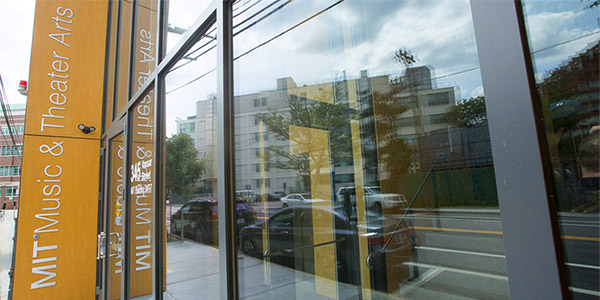
Entrance, W97, MIT Theater Building
2021 WORLD UNIVERSITY RANKINGS | TIMES HIGHER EDUCATION
MIT's social science fields ranked No.1, arts and humanities fields No.2, worldwide
Social Sciences | Arts and Humanities
POLITICAL SCIENCE
Fotini Christia named director of the Sociotechnical Systems Research Center
Christia, a professor of political science, will spearhead the Institute’s interdisciplinary center that studies high-impact, complex societal challenges. Dean Daniel Huttenlocher cited Fotini’s "breadth as a social scientist, on-the-ground approach, use of data science and computational techniques, and application of novel methods to understand how societies are being shaped in diverse areas."
Story
SECURITY STUDIES PROGRAM
Kathleen Hicks PhD '10 to lead Biden's Dept. of Defense Agency Review Team
Hicks is the Senior VP and Director of the International Security Program at the nonpartisan Center for Strategic and International Studies, a leading U.S. thinktank. Agency review teams are responsible for understanding the operations of each agency, ensuring a smooth transfer of power, and preparing the new administration to hit the ground running on day one.
Learn more at BuildBackBetter

Fotini Christia, Professor of Political Science, and Director, SSRC; Kathleen Hicks, PhD '10, Vice President, CSSI, and lead, Defense Agency Review Team for the Biden administration; Joshua Sokol, SM '15, science writer
SCICENCE WRITING
Joshua Sokol '15 wins American Institute of Physics Science Communication Award
Sokol receives the award for his Quanta Magazine article, The Hidden Heroines of Chaos. "Today, chaos theory is part of the scientific repertoire," Sokol writes, "But the many retellings of chaos’s birth say little to nothing about how Margaret Hamilton and Ellen Gille wrote the specific programs that revealed the signatures of chaos." Judges applauded the article for weaving the science of chaos theory and physics with a commentary on the role of women in science.
Announcement | The Hidden Heroines of Chaos
CENTER FOR INTERNATIONAL STUDIES
Eight students named Human Rights and Technology Fellows
Five graduate students and three undergrads will be exploring human rights issues that are either aided or exploited through the use of technology. Bravo to graduate students Timothy Loh; Raha Peyravi; the team of Srishti Kamat & Tomás Guarna; and Alex Reiss Sorokin; and to undergraduates Alison Wang '24; Jeffrey Shen '23; and Kelly Wu '22.
Story
MEDIA DIGEST
2020 ELECTION
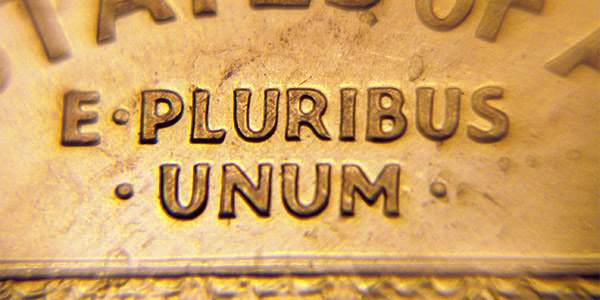
WALL STREET JOURNAL
Administrators, ordinary citizens together made a fair, safe, secure election possible | Stewart and Persily
Leading election experts Charles Stewart III of MIT and Nathaniel Persily of Stanford, co-founders of the Healthy Elections Project, cite the smooth administration of the 2020 Election, suggest updates for the mail-in balloting process, and give thanks for "the heroic and successful efforts of election administrators around the country."
Commentary at The Wall Street Journal
THE NEW YORK TIMES
Democracy worked this year. But it is under threat. | Healthy Elections Project
America's pandemic election was a remarkable, unlikely feat. “The challenges and obstacles were perhaps the highest in history, or at least since the Spanish Flu in 1918, and we saw fewer problems than in any presidential election since Bush v. Gore,” said Nathaniel Persily, a Stanford law professor and co-director of the Stanford-M.I.T. Healthy Elections Project.
Story at The New York Times
MARKETPLACE
On the history of voting technology | Charles Stewart III
“Voting would be very different in the United States without the use of computing technologies,” says Stewart, “much like all of public policy, and actually all of our commercial lives, would be very different without the use of information technology to create the networks to do all of the transactions and allow us to do almost everything we do hundreds of times every day.”
Full story via Marketplace
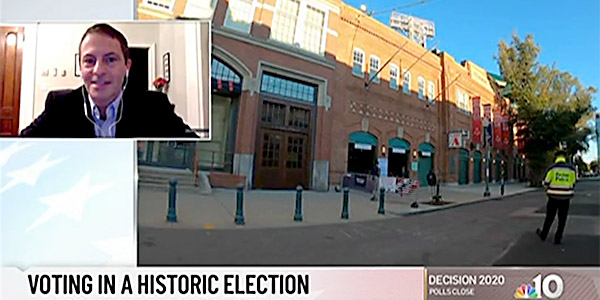
NBC
Voting in a historic election | Christopher Capozzola
Capozzola, a Professor of History, tells NBC that while Americans have voted before during a pandemic, and in times of civil unrest, and also in very large numbers — the combination of all three factors in one election is unprecedented in American history.
Commentary at NBC
BLOOMBERG
White voters in swing-state counties send the GOP a warning | Charles Stewart III
“Metropolitan counties, whether they are the central city or in the surrounding suburbs, have all shifted” away from Trump, said Stewart. “People who have college degrees who are not the top earners, and are also younger, have internalized a set of values that cause them to recoil at Trump's behavior.”
Story at Bloomberg
BUZZFEED
Our obsession with polls could be interfering with democracy | Election Lab
“Forecasting increases certainty about an election’s outcome, confuses many, and decreases turnout....Lonna Atkeson, a member of the MIT Election Data and Science Lab, said that effect may have played a role in this year's Maine senate race."
Story at Buzzfeed
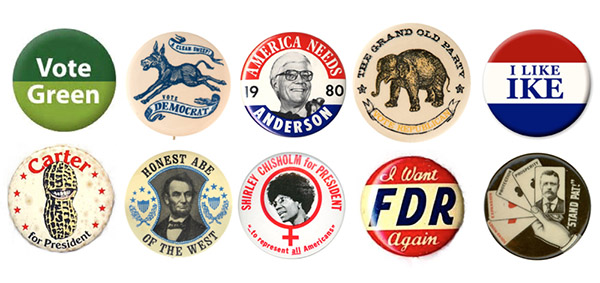
THE GUARDIAN
US voter demographics in 2020 looked a lot like 2016 | Charles Stewart III
The picture appears to be strikingly similar to what it was in 2016, said Stewart, founding director of MIT's Election Data and Science Lab. “There were slight changes, but the changes in the electorate, at least the ones who showed up to vote on election day, are much less dramatic than we were being led to believe by the pre-election polls.”
Commentary at The Guardian
SLATE
Unlocking the vote in jails
"The majority of the 745,000 people held in local jails are eligible to vote, but few do. Advocates say it’s voter suppression on a national scale. People in jail also disproportionately come from communities of color that are heavily policed. 'We do start to think about those neighborhoods losing more voters than others,' said Ariel White, an MIT political scientist. 'And that concentration really starts to matter in, for example, local elections,' which can sometimes hinge on a few hundred votes."
Story at Slate
CRITICAL RESPONSE
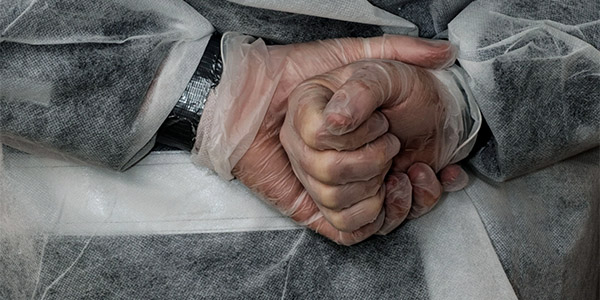
Detail, photo by Antoine d' Agata, via The Atlantic
THE ATLANTIC
The pandemic broke America's understanding of safety
in America, blame for large-scale destruction and death is often shunted onto those with the least power to change policy or protect themselves. “Think about all the accidents on oil platforms, or drilling rigs,” said Susan Silbey, an MIT professor of anthropology and sociology who studies workplace safety. “It's the same few companies over and over again. They always blame the workers.”
Story at The Atlantic
THE NEW YORK TIMES
Let states split the Electoral College votes | Peter Diamond
Professor emeritus Diamond writes to suggest that while ratification of a constitutional amendment to end the Electoral College and rely on the overall popular vote would be very difficult, another "step in the same direction would be an amendment requiring each state to divide its electoral vote between the two leading candidates within the state, in proportion to the votes received."
Letter at The New York Times
THE FINANCIAL TIMES
What the South Sea Company can teach us | Tom Levenson
Levenson's new book, Money for Nothing, is a sweeping story of how the great minds of the Scientific Revolution applied their ideas to people, money, and markets — and invented modern finance. Nominated for the 2020 FT-McKinsey Best Financial Book of the Year prize. (Random House, 2020)
Review at Financial Times
ARTS AT A DISTANCE
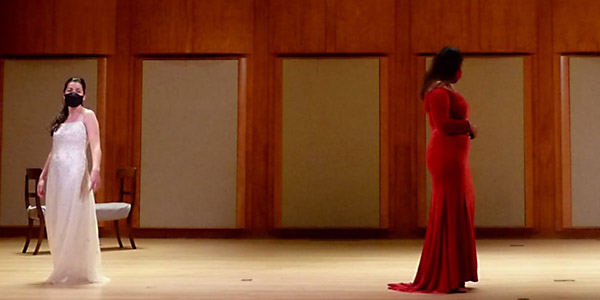
Performers onstage at the Longy School of Music for the filming of "Dido and Aeneas"; photo by Boston Camerata
WBUR
Boston Camerata revisits Purcell's 'Dido And Aeneas' | Ellen T. Harris
Somerville Poet Laureate Lloyd Schwartz speaks "to one of Boston’s treasures, MIT Music Professor Emeritus Ellen T. Harris, internationally admired expert on Baroque music, especially Handel and Purcell. She appears in brief vignettes on the Boston Camerata website and will also do a half-hour pre-performance talk. What, I asked her, made 'Dido' so special?"
Story at Boston Public Radio
ECONOMICS
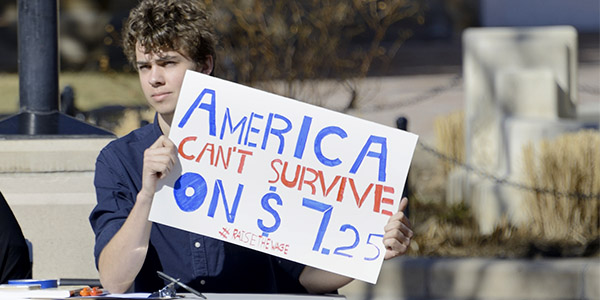
NBC
Increasing the minimum wage would help, not hurt, the economy | David Autor
“The best evidence is that judiciously set minimum wages make a lot of sense. They raise earnings, reduce individual and family poverty, and have no measurable negative effects on employment,” said Autor.
Story at NBC
THE NEW YORK TIMES
Don't Fear the Robots & Other Lessons from MIT's Task Force on the Future of Work
"The U.S. economy produces larger wage gaps, proportionately fewer high-quality jobs, and less intergenerational mobility than most other developed nations do, the researchers found. And America does not seem to get a compensating payoff in growth. Nor does the lagging position of American workers appear to be the result of technology. 'It's not that we have better technology, automating more middle-wage jobs,' said David Autor, an MIT labor economist and a co-author of the report. 'We have worse institutions.'"
Story at The New York Times
MARKETPLACE
Worrying comes with costs | Frank Schilbach
“There's a budget that you have in your mind for mental energy that you can devote to different things,” said Schilbach, a behavioral economist at MIT. “And if you worry a lot about things that are out of your control, then you have fewer cognitive resources available for other things in your life.”
Story at Marketplace
SECURITY STUDIES
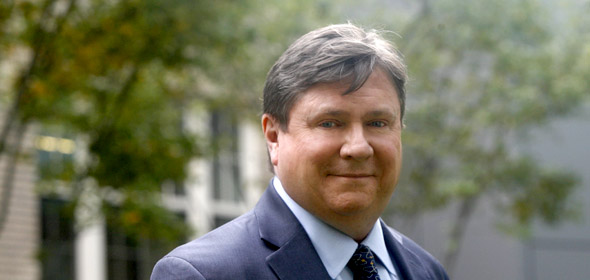
Jim Walsh, Senior Research Associate and nuclear expert, MIT Security Studies Program; photo by Allegra Boverman
HERE & NOW - WBUR
The future of the Iran Nuclear Deal | Jim Walsh
Walsh, a Senior Research Associate and nuclear expert at MIT discusses Iran's ability to produce a nuclear weapon and the future of the nuclear deal.
Conversation at Here & Now
PANDEMIC-RELATED MEDIA
At-A-Glance List of Pandemic-related Media Publications from MIT SHASS
An ongoing list of commentaries from our School community to inform policy and to increase public understanding of the pandemic.
Collected Publications
EDUCATION IN THE PANDEMIC
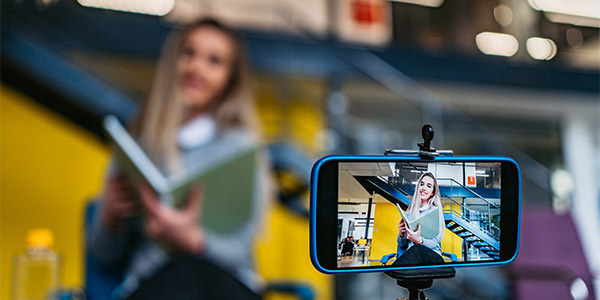
INSIDE HIGHER EDUCATION
A renewed focus on the practice of teaching | Shigeru Miyagawa and Meghan Perdue
"The Institutional Research survey, to which over 830 faculty members responded, and the interviews we conducted revealed a picture of instructors engaging creatively and energetically not only to teach online, but also to do so with a fresh attitude toward teaching."
Commentary at Inside Higher Education
WBUR
Hybrid learning from the classroom | Justin Reich
Reich, director of MIT's Teaching Systems Lab, said in the absence of pandemic leadership on state and national levels, districts have been asked to take on ludicrous amounts of work, like getting internet access for students at home.
Story at WGBH
PANDEMIC ECONOMICS

BOSTON PUBLIC RADIO
Vaccine logistics and the future of the ACA | Jonathan Gruber
MIT health economist Gruber explained why he’s (mostly) optimistic about the prospect of a coronavirus vaccine and discussed the complicated logistics involved in distributing it.
Conversation at Boston Public Radio
The Media + Awards Digest is a section
of Said and Done, the School's online digest.
EXPLORE
Follow us




Subscribe to Said and Done
10 issues a year
Making a Better World
Basic Research | Citizenship | Computing and AI | Education
Health of the Planet | Human Health | The Human Factor
Arts Innovation | Social Innovation
Perspectives for the Pandemic
Explore the Series
Making a Just Society
Explore the Resources
Solving Climate
Browse the Series
Ethics, Computing, and AI
Browse the Series
Computing and AI: Humanistic Perspectives from MIT
Browse the Series
MIT Climate website
A major source of research, innovation, and discussion
Join us!
SHASS on MIT News
Research and Features
MIT Campaign for a Better World
Story | Join Us

Published by SHASS Communications
Office of the Dean, MIT School of Humanities, Arts, and Social Sciences
Editor and Designer: Emily Hiestand
Publication Associate: Alison Lanier
Media Relations Manager: Stephen Oakes
Published 19 November 2020